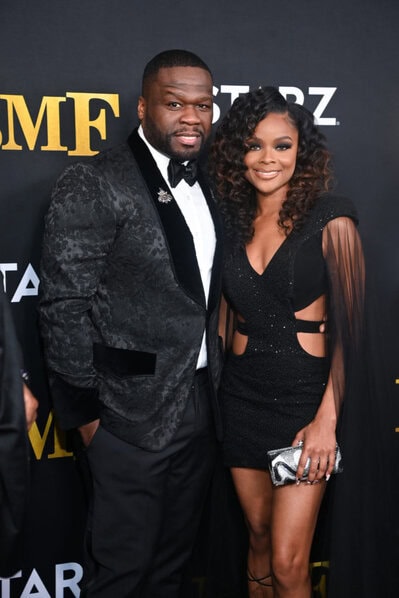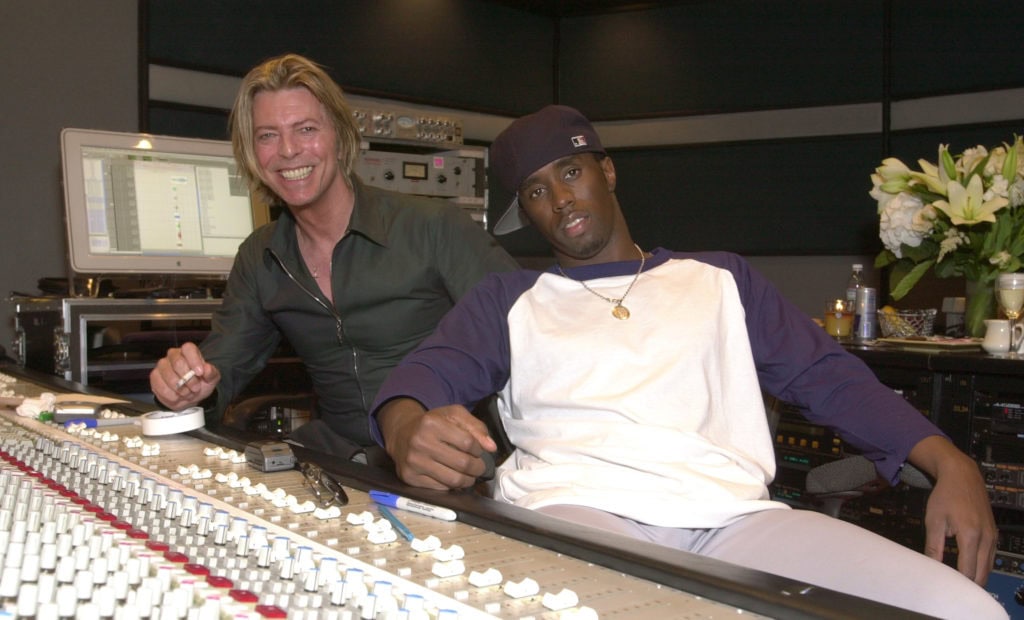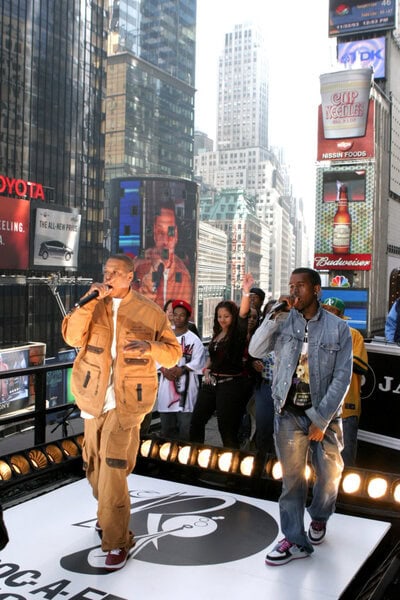When Curtis Jackson called in Sean Combs and Shawn Carter for a pompous posse cut, the result was more than just a smash hit: it was a forecast of more mogul talk.
On Sep. 11, 2007, 50 Cent and Kanye West went head-to-head in a battle for SoundScan supremacy.
The superstar showdown, promoted with Don King caricature, still stands as perhaps the biggest sales spectacle in hip-hop history. Competing against digital downloads in the era of peak piracy, 50 Cent’s Curtis and Kanye West’s Graduation leaned into each other’s mass momentum for a clash of the titans that sold records in droves.
When the first-week numbers came out, Kanye eclipsed Curtis 957,000 to 691,000.
They say styles make fights, and that couldn’t have been truer in said scenario. West, then the underdog, beat the bully on the block by appealing to the masses with a mix of musicality, outlandish ambition, and vulnerability. 50, on the other hand, stuck with the tried and true Aftermath formula of big bass beats, pop hooks, and aggressive lyrics.
Heading into week two with his back against the ropes, 50 phoned in a favor.
Doubling down on the album’s massive third single, “I Get Money,” 50 forecasted his future: hitting home runs to a home audience.
Leaning into New York’s rabid fanfare, Curtis enlisted Diddy and Jay-Z for the “Forbes 1-2-3 Remix” of his hypnotic hit. Also known as the “Billion Dollar Remix,” the city-centric cut coincided with Forbes’ annual list of hip-hop’s top earners of the previous year:
- Jay-Z: $34 million
- 50 Cent: $32 million
- Diddy: $28 million
At the time, the New York Giants of rap were winning off Reebok residuals, Coca-Cola acquisitions, and MTV programming. While West won the war in regard to first-week album sales and shifting hip-hop culture, each of the three moguls appearing on the “I Get Money” remix released 15 years ago this week remains a full-on cash cow today.
50 Cent
While Curtis Jackson didn’t retire from rap after losing the sales war with Kanye West in 2007, the incident did spark a shift in strategy.

Less viable commercially amid the changing culture of hip-hop, 50 Cent the businessman came to emerge more and more, taking risks in an increasing number of arenas.
Though 50 pulled in $32 million in 2006, he reportedly made between $40 million and $100 million in 2007 off of Coca-Cola’s acquisition of Vitamin Water alone thanks to being an equity partner in Glacéau, the hydration drink’s manufacturer.
Less than a decade after the windfall, Jackson filed for bankruptcy in 2015 — but in typical 50 fashion, this proved to be more of a blip on the radar against the backdrop of his broader cultural resonance. Since that time, he got right back on his horse, making serious moves as a producer and investor.
In 2022, Curtis Jackson’s best known for his production work on the Starz original series Power, on which he also appeared as an actor. The drama is wildly successful, spanning prequels, spin-offs, and a joint venture with Will Packer Productions and Universal Television.
He’s been up and he’s been down, but he’s still “stanky rich” after all these years.
Selected 50 Cent Business Ventures & Investment Milestones
- 2003: Signed deal with Reebok said to have earned him $80 million
- 2005: Sold 1.5 million units of his album The Massacre in only four days
- 2014: Negotiated $23 million buyout from Interscope
- 2017: Sold stake in Effen Vodka for $60 million
- 2022: Signed partnership with Houston Rockets as owner of Sire Spirits
Diddy

Hip-hop’s long list of moguls begins and ends with Sean “Diddy” Combs in many ways.
Working his way from intern at Uptown Records to entreprenuer at Bad Boy, the Harlem hitmaker formerly known as Puffy has broken big artists after big artist — and become one himself. Hosting a catalog of ventures and records equally diverse, he’s made millions in the days of street team promotion to that of the modern streaming era.
Recently, Forbes estimated that Diddy will pull in a whopping $90 million in 2022 earnings — more than triple what he made when jumping on the Curtis cut.
From fashion to vodka to mixtapes to television, Puff’s passed peers and pioneers by taking bigger and bolder swings than most bother to dream of. Here’s a quick summary of just how the multi-hyphenate now known as Love has grown his portfolio.
Selected Diddy Business Ventures & Investment Milestones
- 1992: Founded Bad Boy Records, said to have reached $500M in sales within first decade
- 1998: Started Sean John clothing company, selling one-third of company in 2017 for $70 million
- 2007: Partnered with Diageo to take over Circoc Vodka, said to be worth $941 million in 2018
- 2013: Co-founded Revolt TV, signed carriage deal with Time Warner Cable
- 2021: Bought back Sean John for $7.6 million
Jay-Z
At the the time of the 2007 arrival of the “I Get Money (Forbes 1-2-3 Remix),” Hov had the top spot as hip-hop’s highest earner.

By 2019, he surpassed all peers by becoming hip-hop’s first billionaire. And while he may have left the competition behind, he brought friends with him.
Early signees such as Rihanna and Kanye West have joined his exclusive inner circle, with wife Beyonce blazing a trail to attain similar financial status.
What’s perhaps most impressive about Jay-Z’s business brilliance is the fact that he’s always retained revered status as an artist that feels beyond ironclad at this point in the game.
When it comes to making music, 50 Cent and Diddy possess the most heat in the role of cameo feature or overseeing producer from a marketing standpoint, but the man said to make the Yankee fitted more famous than Derek Jeter wears all executive and creative hats with ease as the world still waits with bated breath for another.
To come up as the biggest breadwinner amongst rap royalty, Hov made moves since the start. Here’s but a mere sample of his most impactful:
Selected Jay-Z Business Ventures & Investment Milestones
- 1995: Co-founded Roc-a-Fella records, responsible for over 20 multi-Platinum albums
- 2007: Sold rights to Rocawear apparel brand for $204 million
- 2013: Launched Roc Nation Sports, an agency that later signed LaMelo Ball, Saquon Barkley, and more
- 2021: Sold 50% of Armand de Brignac to LVMH at valuation of $640 million
- 2021: Sold TIDAL to Square for $300 million
15 years later, the legacy of the “I Get Money” remix lives on.
Perhaps the only things healthier than its impact are the bank accounts of its creators.